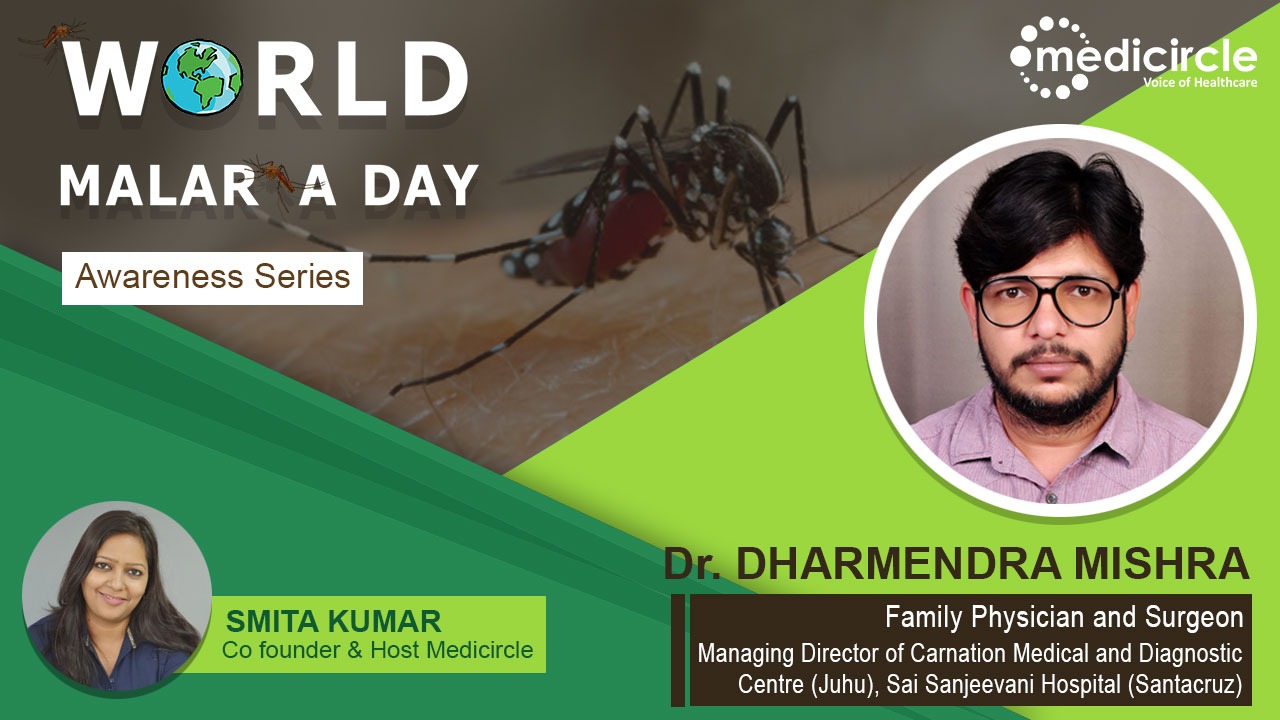World Malaria Day is observed annually on 25 th April to bring global attention to the efforts being made to end malaria and bring about a change to eradicate malaria completely. The World Health Organization has noted impressive gains by India in its fight against malaria. According to the WHO report, most malaria prevention campaigns were able to move forward this year without any delays in spite of the COVID19 pandemic. India recorded the largest reduction in malaria cases in Southeast Asia from 2000-2019. India has contributed to the largest drop in cases nationwide from 20 million to 6 million. In Spite of outstanding achievement by India in cases of Malaria, strict intervention is needed to eradicate malaria completely from India to zero cases.
At Medicircle, we are conducting an awareness series on malaria with eminent doctors for the World Malaria Awareness to boost awareness and educate people about the prevention of malaria
Dr.Dharmendra Mishra is a well-known doctor based in Mumbai with 11 years of experience. He is associated with many hospitals and clinics in Mumbai. Currently, Dr. Mishra is attached with Sai Sanjeevani Polyclinic & Nursing home, Mumbai
Transmission of malaria
Dr. Dharmendra Mishra informs, “Malaria is basically a parasite that transmits the infection with help of female Anopheles mosquitoes. When this mosquito bites the person, they transfer the malaria parasites causing the infection through the bloodstream in the human body. Malaria symptoms develop 4 - 20 days after this infected mosquito bites. It is an infection and the same mosquito can bite many persons in the community and transmit the infection.”
Symptoms of malaria
Dr.Mishra explains, ”The symptoms of classical malaria are as follows:
- High-grade Fever with chills
- Headache
- Vomiting
The fever of COVID is also similar resulting in high-grade fever, body ache with other symptoms. Malaria fever is rising with chills and for short period. COVID symptoms may or may not be present with chills. Loss of smell and taste is marked in COVID fever. Perspiration after the fever is marked in COVID.”
Precautions and preventative measures
Dr. Mishra states, “To know the preventive measures of malaria, it is important to eliminate the cause. Malaria is considered seasonal. Malaria parasites are found in stagnant water generally in the rainy season. These are some important preventative measures:
- Maintain hygiene and cleanliness in your surrounding areas
- Use mosquito nets to protect yourself
- Use repellant creams on your body
- Awareness is also very important about malaria
Difference between malaria and COVID fever
Dr. Mishra says,” Malaria fever is very high and rising in temperature with chills whereas the COVID fever is stable at a certain temperature like 102 degrees. A COVID test is very important to start with the proper mode of treatment. Awareness is very important in the case of malaria and COVID. There is a decrease in cases of malaria because of awareness and monitoring of malaria cases. There is only one vaccine for malaria which cannot eradicate malaria from India.”
Details and information about malaria is a must
Dr. Mishra informs, “On a basic level, the general practitioners and doctors must be aware of malaria, typhoid, and COVID. On basis of symptoms, you can definitely differentiate about it. By sharing your knowledge about typhoid, malaria, and COVID, we can get into the details of the disease which is important to diagnose on symptoms level. Awarness among doctors is also very important.”
Treat about malaria
Dr.Mishra states, “ Treatment is simple with anti-malarial drugs. Symptomatic drugs like paracetamol can be given. Proper anti-malarial drugs are important for treatment.”
(Edited By Dr.Rati Parwani)

 Dr. Dharmendra Mishra gives a worthy explanation about the transmission of malaria and informs about the difference between malaria and COVID fever. He also explains the preventative measures for malaria by knowing its causative factors.
Dr. Dharmendra Mishra gives a worthy explanation about the transmission of malaria and informs about the difference between malaria and COVID fever. He also explains the preventative measures for malaria by knowing its causative factors.







.jpeg)




.jpg)







.jpeg)

.jpg)




.jpg)




.png)



